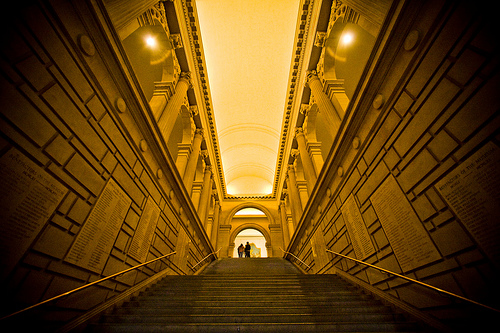A Post-Totalitarian Tourist from Coast to Coast
by Orlando Luis Pardo Lazo and translated by Alex Higson / May 27, 2013 / No comments
In which a visit to a Hollywood mall feels more “real” than the Metropolitan Museum of Art.

In the Metropolitan Museum of Art in New York City, History uses Beauty to hide its genocidal nature. Photo: Thomas Hawk via Flickr.
I walk into the Metropolitan Museum of Art in New York and everything seems very false. It must be a trauma that I’ve dragged along with me from Cuba’s totalitarianism. Mummies, jewels, paintings, masks: Hundreds of objects that I previously knew only as photos in newspapers and books. When all of a sudden they appear before me in real life, none of the artifacts seem real. So I leave with a sense of failure, of incredulity, and with fewer dollars after having donated some to the museum for my visit.

- Is it worth-while to focus on the last images and letters coming from the inside of the last living utopia on Earth? Is Cuba by now a contemporary country or just another old-fashioned delusion in the middle of Nowhere-America? A Cold-War Northtalgia maybe? Can we expect a young Rewwwolution.cu within that Ancien Régime still known as The Revolution? I would like to provoke more questions than answers.

- Orlando Luis Pardo Lazo was born in Havana City and still resides and resists there, working as a free-lance writer, photographer and blogger. He is the author of Boring Home (2009) and is the editor of the independent opinion and literary e-zine Voces.
A few days later, I’m lucky enough to have switched coasts and to be glimpsing the USA’s other ocean. There, in a mall in Hollywood, I manage to make up for that bad first impression. They too are showing off treasures from Egypt and almost all the other empires of antiquity. But the impression I get from those kitsch capitalist trinkets is that each piece represents a unique, invaluable, original style.
Thus, one of the greatest museums in the world comes across as a mausoleum of untruths, as the domain of that fraud whereby History uses Beauty to hide its genocidal nature (with the museum as the house of Evil). The Hollywood mall, on the other hand, in all its warehouse monstrosity and its consumerist candor, seems more like a vortex of desires and interactions, of wanting and participating, of life dramatized, but true, in which anything is still possible. Whereas in the museum, even memory is repressed by the guide’s intentional omissions.
I know that these are delirious ciphers, but they are perfect for writing my monologue as a tourist terrified in the face of Liberty (as a people, while us Cubans cry out for change, we seem to avoid it more and more): “The Museum not as a metaphor, but as castrating Castroism in itself,” I write with irony in my diary. “The Mall not as exile experience, but as a post-historical hope.”




